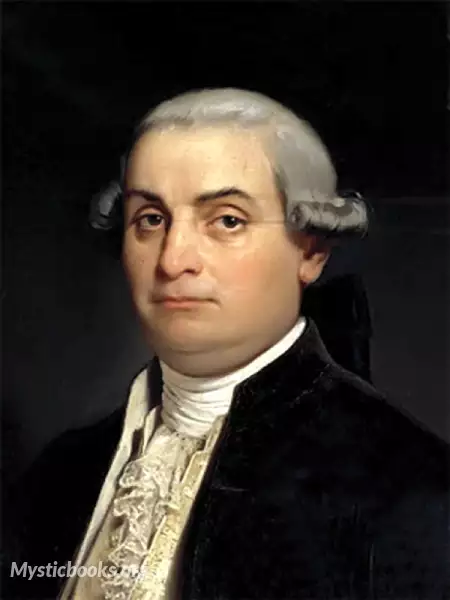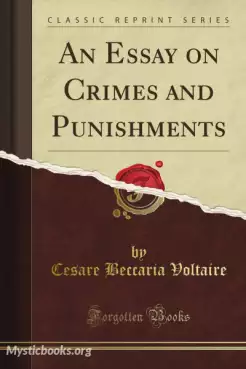
Timeline
Title
Country/Nationality
Cesare Beccaria
Cesare Bonesana di Beccaria, Marquis of Gualdrasco and Villareggio was an Italian criminologist, jurist, philosopher, economist and politician, who is widely considered one of the greatest thinkers of the Age of Enlightenment. He is well remembered for his treatise On Crimes and Punishments (1764), which condemned torture and the death penalty, and was a founding work in the field of penology and the Classical School of criminology. Beccaria is considered the father of modern criminal law and the father of criminal justice.
Beccaria was born in Milan on 15 March 1738 to the Marchese Gian Beccaria Bonesana, an aristocrat of moderate standing from the Austrian Habsburg Empire. Beccaria received his early education in the Jesuit college at Parma. Subsequently, he graduated in law from the University of Pavia in 1758. At first he showed a great aptitude for mathematics, but studying Montesquieu (1689–1755) redirected his attention towards economics. In 1762 his first publication, a tract on the disorder of the currency in the Milanese states, included a proposal for its remedy.
In his mid-twenties, Beccaria became close friends with Pietro and Alessandro Verri, two brothers who with a number of other young men from the Milan aristocracy, formed a literary society named "L'Accademia dei pugni" (the Academy of Fists), a playful name which made fun of the stuffy academies that proliferated in Italy and also hinted that relaxed conversations which took place in there sometimes ended in affrays. Much of its discussion focused on reforming the criminal justice system. Through this group Beccaria became acquainted with French and British political philosophers, such as Diderot, Helvétius, Montesquieu, and Hume. He was particularly influenced by Helvétius.
With much hesitation, Beccaria accepted an invitation to Paris to meet the great thinkers of the day. He travelled with the Verri brothers and was given a warm reception by the philosophes. However, the chronically-shy Beccaria made a poor impression and left after three weeks, returning to Milan and to his young wife Teresa and never venturing abroad again. The break with the Verri brothers proved lasting; they were never able to understand why Beccaria had left his position at the peak of success.
Beccaria nevertheless continued to command official recognition, and he was appointed to several nominal political positions in Italy. Separated from the invaluable input of his friends, he failed to produce another text of equal importance. Outside Italy, an unfounded myth grew that Beccaria's literary silence resulted from Austrian restrictions on free expression in Italy. In fact, prone to periodic bouts of depression and misanthropy, he had grown silent on his own.
Legal scholars of the time hailed Beccaria's treatise, and several European emperors vowed to follow it. Many reforms in the penal codes of the principal European nations can be traced to the treatise, but few contemporaries were convinced by Beccaria's argument against the death penalty. Even when the Grand Duchy of Tuscany abolished the death penalty, the first nation in the world to do so, it followed Beccaria's argument about the lack of utility of capital punishment, not about the state's lacking the right to execute citizens. In the anglophone world, Beccaria's ideas fed into the writings on punishment of Sir William Blackstone (selectively), and more wholeheartedly those of William Eden and Jeremy Bentham.
In November 1768, he was appointed to the chair of law and economy founded expressly for him at the Palatine College of Milan. His lectures on political economy, which are based on strict utilitarian principles, are in marked accordance with the theories of the English school of economists. They are published in the collection of Italian writers on political economy (Scrittori Classici Italiani di Economia politica, vols. xi. and xii.). Beccaria never succeeded in producing another work to match Dei Delitti e Delle Pene, but he made various incomplete attempts in the course of his life. A short treatise on literary style was all he saw to press.
In 1771, Beccaria was made a member of the supreme economic council, and in 1791 he was appointed to the board for the reform of the judicial code, where he made a valuable contribution. During this period he spearheaded a number of important reforms, such as the standardisation of weights and measurements. He died in Milan.
A pioneer in criminology, his influence during his lifetime extended to shaping the rights listed in the US Constitution and Bill of Rights. On Crimes and Punishments served as a useful guide to the founding fathers.
Beccaria's theories, as expressed in On Crimes and Punishments, have continued to play a great role in recent times. Some of the current policies impacted by his theories are truth in sentencing, swift punishment and the abolishment of the death penalty in some U.S. states. While many of his theories are popular, some are still a source of heated controversy, even more than two centuries after the famed criminologist's death.
Books by Cesare Beccaria

An Essay on Crimes and Punishments
Beccaria and the two brothers Pietro and Alessandro Verri started an important cultural reformist movement centered around their journal Il Caffè ("The Coffee House"), which ran from the summer of 1764 for about two years, and was inspired by Addison...